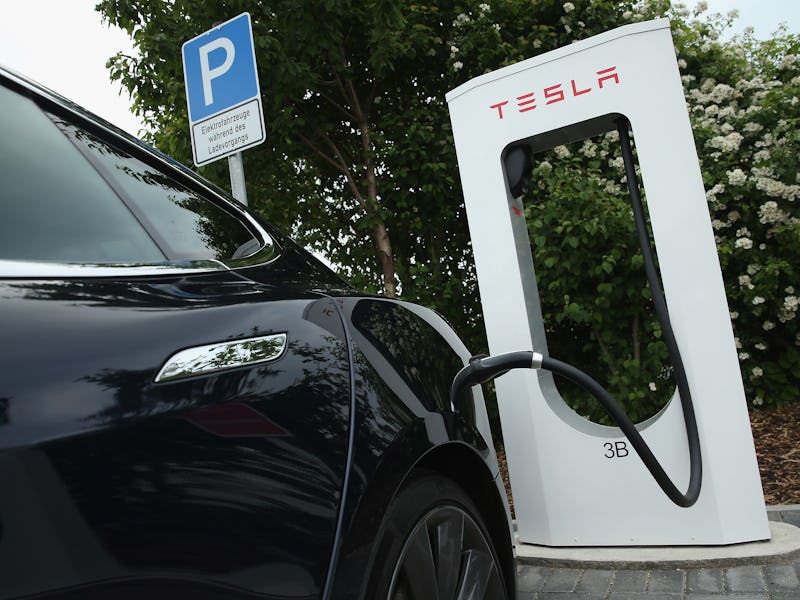Is Tesla the Netflix of Cars? Data Scientists Say Probably Not
Automakers are vying to be the best at data collection.

Elon Musk can’t contain his excitement. It’s obvious why he’s been so enthusiastic on Twitter: the Model 3, designed and priced to be the first mass market Tesla, is on track to bring in $10 billion in sales from the first few days of sales alone, and it’s sent Tesla stock rising. Everything feels like Tesla’s moment.
Tesla will have more than 300,000 cars on the road in the next two years if everything goes according to plan. But it won’t just be cars on the road, it will be more than 300,000 constantly streaming data collection devices delivering valuable information back to Tesla to use at will.
In other words, Tesla has the possibility to become the big data collector of the automobile world — the Netflix of cars. If, that is, Tesla isn’t already too late to the game.
Whether Tesla follows through on its promise that the Model 3 roll-out won’t be a repeat of the delayed Model X rollout, the next 10 to 15 years hold plenty of potential: Its cars already transfer information over wifi when they are plugged in, as shown by the downloadable Autopilot system released in 2015.
Next up: Data transfer from the car back to the company, providing loads of data for the transportation market, which is essentially a data desert.
“Everybody is competing now to be the kind of go-to data company for the transportation sector, which is one of the sectors like healthcare and a few others that is producing tons and tons of data, but operates terribly inefficiently,” Steven Weber, a UC Berkeley professor with a background in information technology and data, tells Inverse.
“It touches everybody’s lives every day. We all sit in traffic jams.”
Traffic is just one of the many examples of how transportation planning has fallen behind.
Big data means many things to a car company. Metrics on average trip length, days between charges, distance between charges, urban vs. suburban vs. rural drivers, how often people update software, how many people ride in a car, how many people never use the air-conditioner, and how often drivers activate Ludicrous mode are all among the questions Tesla likely wants to know about its drivers.
Netflix is today’s big data company that everyone is familiar with. If it wasn’t for Netflix collecting data, the streaming platform would be a mess. Because Netflix is able to predict what you want to watch from its more than 14,000 options based on your history, the algorithms driving Netflix know what you want better than you know what you want.
Tesla is in the position to gather data in a similar way. In a world where Tesla works perfectly, the data it collects will allow the car to predict where you are going at each time of day. If there’s an accident on the road that you normally take every night at 9:17 to get some snacks, your Tesla, or any car company that uses that sort of data, could recognize that and offer a different route.
Tesla will also be able to track the features of the car that people don’t use. Whereas the corporate heads at Netflix use big data to figure out which shows to extend for another season, Tesla might use big data to nix cumbersome and unused features.
Big data is crucial for autonomous vehicles to learn what to do and not do, Kun Xie, doctoral student in civil and urban engineering at New York University, tells Inverse. But examples like route awareness are ways that big data can improve people’s lives and safety while we’re waiting for steering wheels to disappear.
However, all this speculation about the big data effects of Tesla could be useless. The company is at a disadvantage because there are just not enough cars on the road to gather meaningful data fast enough. Sure, the data might be valuable to Tesla, but it will be valuable only to Tesla. Other companies could already have dominated the mass data market by the time Tesla manages to get all those Model 3s out.
Even if the Model 3 meets its two-year mark, it will still be behind established car companies. That’s not to mention companies like Uber and Lyft, which collect countless amounts of transportation data every day about its passengers, although that’s a different sort of data: passengers using a service, not drivers using the same car over the long-term.
“They’ve got a pretty steep hill to climb in that regard,” Weber said. “It’s hard for me to see how they will have an advantageous data position vis a vis everybody else is competing for that. And you know, time’s a wasting. Two years is a very long time.”
More and more new cars on the road have location tracking. Judging by how fast people grew comfortable with personal data collection from companies like Netflix, people won’t care about the data. Tesla collects because they will already be used to giving up that type of data to other car companies.
App-based transportation is in the best position to collect and analyze massive quantities of data in a way that improves people’s lives — from a big data standpoint, if not an Uber employment standpoint.
The value of transportation data can best be explained from the viewpoint of the mayor or transportation director of a major city. The first step is figuring out where the transportation methods break down. Then, the people in charge need to figure out how the problem can be fixed. Finally, the leaders of the city can begin to fix the broken infrastructure that plagues pretty much everywhere in America. Big data can solve those first two problems, and leaders are going to look to companies collecting data on an Uber-level scale, not a Tesla scale.